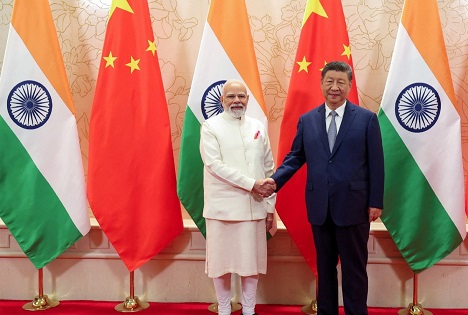Le président chinois Xi Jinping et le Premier ministre indien Narendra Modi se sont engagés dimanche à résoudre leurs différends frontaliers et à renforcer la coopération, avant l’ouverture du sommet de l’Organisation de coopération de Shanghai (OCS) qui se tient dans la ville côtière de Tianjin.
Xi a rencontré Modi avant l’ouverture du sommet, marquant un dégel officiel entre les deux puissances nucléaires.
Il s’agit de la première visite de Modi en Chine depuis la détérioration des relations suite à des affrontements meurtriers entre soldats chinois et indiens à la frontière en 2020. Modi visite la Chine dans le cadre de l’adhésion de son pays à l’OCS, un groupe régional politique, économique et sécuritaire fondé par la Chine.
Lors de son discours d’ouverture, Modi a déclaré que les relations avec la Chine évoluaient dans une « direction constructive », ajoutant qu’« il y a un environnement pacifique à la frontière après le désengagement ».
De son côté, Xi a exprimé l’espoir que la réunion de Tianjin contribuerait à « élever » les relations et à « promouvoir un développement durable, sain et stable des relations bilatérales », selon la télévision centrale chinoise.
Il a ajouté que les deux parties « ne devraient pas laisser la question frontalière définir la relation globale entre la Chine et l’Inde », soulignant que le développement économique devrait être la priorité principale des deux pays.
Xi a déclaré : « Tant que la Chine et l’Inde adhèrent à l’objectif suprême d’être partenaires et non concurrents, et qu’elles offrent des opportunités de développement plutôt que des menaces, les relations sino-indiennes prospéreront et progresseront régulièrement. »
Le président russe Vladimir Poutine, arrivé à Tianjin dimanche, doit également rencontrer les dirigeants chinois et indien dans les prochains jours.
Avant la visite de Modi, le ministre chinois des Affaires étrangères Wang Yi s’est rendu à New Delhi début août, où les deux parties ont annoncé leur rapprochement. Les deux gouvernements se sont engagés à relancer les pourparlers frontaliers et à reprendre la délivrance des visas ainsi que les vols directs.
La visite de Wang a coïncidé avec la décision du président américain Donald Trump d’imposer un tarif douanier de 50 % à l’Inde en raison de son achat de pétrole russe, mais le processus de reconstruction des relations entre New Delhi et la Chine était en préparation depuis plusieurs mois.
La Chine et l’Inde ont intensifié les visites officielles cette année et ont discuté de l’assouplissement de certaines restrictions sur le commerce et la circulation transfrontalière. En juin dernier, Pékin a autorisé les pèlerins indiens à visiter les sites sacrés au Tibet.












Recommended for you
طالب الرفاعى يؤرخ لتراث الفن الكويتى فى "دوخى.. تقاسيم الصَبا"
مدينة المعارض تنجز نحو 80% من استعداداتها لانطلاق معرض دمشق الدولي
تقديم طلبات القبول الموحد الثلاثاء و640 طالبا سيتم قبولهم في الطب
البريد المصري: لدينا أكثر من 10 ملايين عميل في حساب التوفير.. ونوفر عوائد يومية وشهرية وسنوية
سمو الشيخ عيسى بن سلمان بن حمد آل خليفة يستقبل سفير الولايات المتحدة الأمريكية لدى مملكة البحرين
الجغبير: القطاع الصناعي يقود النمو الاقتصادي